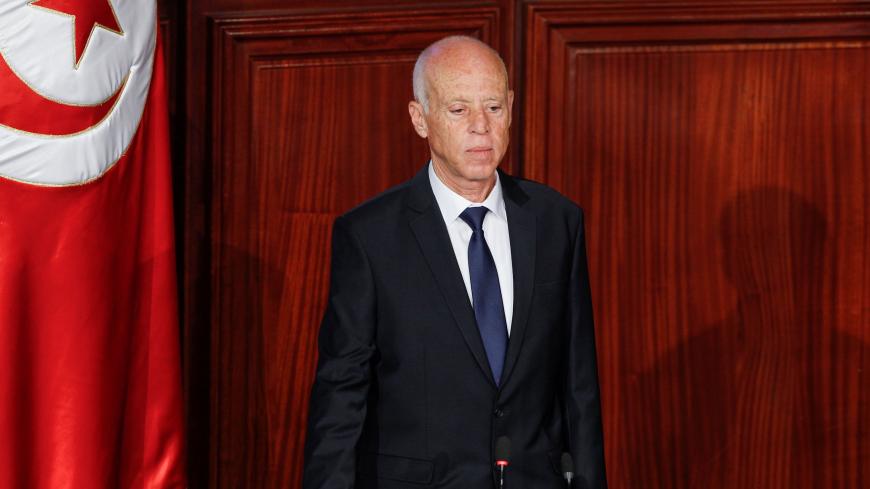The Tunisian Free Destourian Party parliamentary bloc criticized in a statement issued Jan. 6 the nebulosity of the Tunisian stance and the presidential silence in the face of the Libyan developments.
This comes after Turkish President Recep Tayyip Erdogan announced at a conference Dec. 26 that he agreed with Tunisian President Kais Saied on supporting the United Nations-backed Government of National Accord (GNA) in Libya, and that Turkey was to send military troops to Libya once it gets the Turkish parliament’s approval.
The bloc also denounced Erdogan’s unannounced Dec. 25 visit to Tunisia and said it submitted a request in which it called on parliament Speaker Rached Ghannouchi to hold an extraordinary plenary session. It also called on Ghannouchi to summon the minister of foreign affairs and the minister of national defense to know what is really going on and have them inform the Tunisian people of the official Tunisian position and the measures taken to protect the homeland.
The statement said that the Turkish intervention in Libya can harm Tunisian national security.
During the "Midi Show" broadcast Jan. 7 on Mosaique FM, member of parliament Safi Saeed warned the Tunisian diplomacy against the consequences of its silence and said that the Tunisian national security extends from “Libya’s Tobruk to Tunisia’s Tabarka.” He added that the war in Libya could spill over into Tunisia.
Saeed also stressed that Tunisia should seek to establish itself in the coming period because the Libyan issue is directly related to all of the Arab Maghreb countries, and the warring parties in Libya are only seeking to achieve their own interests.
Adnan Monser, director of the Center of Strategic Studies on the Maghreb, told Al-Monitor, “The Tunisian diplomacy has gone into a coma [in the face of the Libyan developments].” He criticized the continued closure of the Tunisian Consulate in Libya since June 19, 2015, and the crisis that the closure has caused for the two countries.
The Tunisian Consulate in Libya was closed after Libya failed to secure the safety of the consulate headquarters and employees.
Monser said that as countries neighboring Libya, such as Algeria, proceed to discuss the crisis caused by the Turkish intervention and the escalation of Khalifa Hifter's forces against the GNA, Tunisia must seize the moment, return to the forefront and play an effective role in looking for peaceful solutions.
He added that Tunisia must also favor dialogue in Libya, as it has common interests and shared borders with the country.
Imed Daimi, secretary-general of Al-Irada Party, said in a Jan. 6 post on his official Facebook page that the situation is very dangerous in the region as it portends a regional war on Libyan soil. This, he added, requires the Tunisian president to immediately visit Algeria to coordinate positions and prepare for the various scenarios.
In a Jan. 6 Facebook post, Tunisian journalist Alaa Zaatour denounced the Tunisian presidency's silence in the face of the Libyan developments at a time when an urgent visit to Algeria is required to coordinate positions.
Abdallah al-Obeidi, a former senior official at the Ministry of Foreign Affairs, told Al-Monitor that Tunisia’s neutral position is aimed at protecting the Tunisian interests and agreements with various international parties in a bid to ensure stability.
He said that Tunisia neither has important international alliances nor sufficient power to confront international opponents such as the United Arab Emirates and Egypt, and its position stems from its geostrategic position, which major international powers currently have set their eyes on.
The Tunisian General Labor Union issued a statement Dec. 26 in which it called on all authorities to be extremely vigilant and cautious so as not to let the country turn into a corridor of weapons or a haven and crossroad for the Islamic State into Libya.
He stressed that the Tunisian foreign policy should focus on the interests of the country, respect the right of brotherhood and neighborliness with neighboring countries and refuse to get involved in suspicious international alliances.
The union said the neighboring countries should be given priority in any mediation process aimed at putting an end to this filthy war. It called for coordination with them to help find a solution to the Libyan fighting.
The Tunisian presidency confirmed in a Jan. 6 statement published on its official Facebook page that German Chancellor Angela Merkel contacted Saied to discuss the latest regional and international developments. The two tackled the situation in Libya and the path of the Libya peace conference to be held in Berlin on Jan. 19. While Merkel invited Saied to Germany, the statement made no mention of an official invitation extended to Saied to attend the conference.
Ahmed Wanis, a Tunisian diplomat and former foreign minister, told Al-Monitor this is due to the policy of neutrality that the country has been adopting since the beginning of the Libyan crisis.
Wanis said the fact that Tunisia was not invited to the conference is detrimental to both the country and its foreign policy, considering that Tunisia is Libya’s closest neighbor on the one hand, and given the cooperation and brotherhood relations between the peoples of the two countries on the other.
Bechir Nefzi, former Tunisian parliamentarian, said in a Jan. 6 Facebook post that Tunisia was not invited due to the nebulosity of its position and the Tunisian president’s neutrality and bad handling of the Turkish decision to intervene in Libya.
Yosri Louati, a journalist for Hakaek Online newspaper, and Kais Bouzouzia, an activist, called on the president to take part in the international consultations on Libya by posting on their Facebook pages: "Kais Saeed, travel! You are not a tree."







